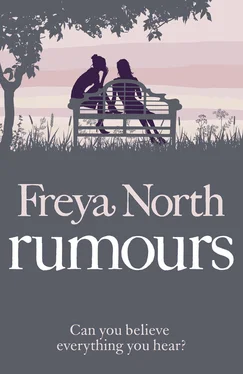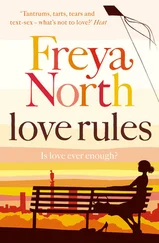1 ...7 8 9 11 12 13 ...21 ‘Yes.’
Lydia sighed, exasperated. ‘Where is that wretched woman!’ She tapped hard against the doors with her cane and Xander noted all the little dents, flecking into the wood like rain against a windscreen. ‘She’s in there, you know. Reading the Mail .’ Lydia spoke the newspaper’s name with such disdain it might as well have been Mein Kampf .
Through the doors, they could hear footsteps and the sound of someone talking to themselves. ‘Is someone at the door? I didn’t hear. I’ll just check.’ The door was opened gingerly and Mrs Biggins’ face peered out. ‘Oh,’ she said, glancing at Lydia, ‘it’s you. And Xander! Xander! Come on in!’
‘You’re an utterly useless woman,’ Lydia told her housekeeper.
‘And you’re forgetful – you must remember to take your keys.’
‘I have my keys!’ Lydia protested.
‘Then why did you knock?’
‘I didn’t. Xander did.’
‘Xander – did you knock?’
He paused, feeling like a ping-pong ball caught in a particularly vicious rally between two dab hands in this long played-out game. ‘I rang the bell,’ he said.
‘You see – you knocked. He rang the bell.’
‘Well, you didn’t answer the bell when he rang. He was probably standing there for yonks. You’re as deaf as Barnaby.’
‘I am not!’
‘You were reading the Mail , then.’ Lydia brushed past Mrs Biggins and into the entrance hall.
‘You’re not going to hang that stinking old coat here,’ Mrs Biggins warned her.
‘No,’ said Lydia, ‘you’re going to hang it in the boot room.’ And she stood still, while Mrs Biggins eased the coat off her, in much the same way as the butler would remove her mother’s mink stole decades ago. Not that any butler who wanted to keep his job would have pulled a face such as Mrs Biggins was currently wearing.
‘We’ll have tea,’ Lydia announced. ‘In the drawing room.’ And Xander thought, one day Mrs Biggins might well say get it yourself.
But not today.
* * *
Tea in the drawing room. It was an institution that Xander enjoyed as much now as then. The anticipation of the tray being brought in, counted down by the frustratingly slow, patient tock of the grandfather clock, while legions of Fortescues observed the event from their slightly tarnished photograph frames crowding the grand piano, the mantelpiece, the ledge in front of the glazed bookcase.
The selection was always the same: sandwiches of fish paste or butter and cucumber slices, and a plate of cakes. Today, it struck Xander how the food seemed to personify the irascible dowager and her cantankerous housekeeper – the cucumber sandwiches delicate and refined like the former, the fish paste slightly common yet comforting like the latter. Similarly, the pastries so elegantly put together with the fancy toppings, just as appealing as the plain but reassuringly doughy Chelsea buns.
‘Will that be all?’ Mrs Biggins asked.
‘Thank you, Mrs Biggins, that will be all.’
‘Thank you, Mrs B.’
‘Lovely to see you, Xander. You send your ma my love. And don’t be a stranger.’
With the large French-polished coffee table between them, Xander and Lydia sat opposite each other on matching sofas – faded, capacious rather than comfortable, fleshed out by a growing collection of daily-plumped cushions to counteract the general sag and lumpiness. Xander offered the sandwiches to Lydia and then took one of each for himself. Lydia poured the tea, the same tea cosy warming the pot that Xander remembered his mother knitting when he was still a boy. There was so much about Longbridge that stayed the same. There were the sounds – the clocks, different in each room, the water in the crunking old pipes complaining its way around the house, the whistle of the kettle on the Aga as dramatic as an air-raid warning. And the smells – Assam tea, ancient tobacco, a faint mustiness from old soft furnishings, a subtle drift of floral arrangements that needed changing, of vegetables cooking in the kitchen, or lavender secreted in little muslin pouches in between cushion and cover. And there was the set-up of each room – the photograph frames and various porcelain ornaments just so, the furniture whose configuration never changed, the heavy folds of the enormous curtains as vertical and precise as the fluting on Greek columns. And the portraits of the ancestors, positioned around the house like sentries, some gazing benignly, some fixing sternly, all staring directly.
‘Little changes, Xander.’
‘I’m pleased.’
‘You still look from portrait to portrait, as if answering questions asked of you in a particular order.’
‘I know.’
‘You’re wearing a tie.’
‘I could have worn a jacket.’
‘Mostly, these days, I see you scampering around in all that ghastly sportswear.’
‘I’m training – I have a half-marathon next week.’
‘Does that mean you’ll be begging me for sponsorship?’
‘Most definitely.’
‘African babies again?’
‘Cancer, this time.’
‘Jolly good. Pastry?’
Xander finished a jam tart and waited for Lydia to raise her eyebrows at the platter for him to help himself to another. ‘Longbridge plums,’ he said, ‘incomparable.’
‘Jars and jars of the bastard stuff in the pantry – help yourself when you go,’ Lydia said. ‘Surplus from the summer fete – the first time we’ve come back with unsold produce. Ever.’
‘Don’t take it personally,’ Xander said. ‘People are holding on to their pennies. Anyway, I heard it was more to do with politics within the committee.’
‘That wretched bouncing castle monstrosity?’
Xander laughed. ‘And the rest.’
‘Personally,’ said Lydia, ‘ I blame all that shopping people do nowadays on those computers. It’s an obsession and, if you ask me, absolutely unnecessary! All those supermarket vans double parking along the high street and all those delivery companies doing the postman out of a job. More tea?’
‘Please.’ He offered his cup because Lydia liked to pour and she wouldn’t tolerate people stretching. ‘How are things here?’ He looked around – it looked the same, but Longbridge was so much more than the house itself. ‘I hear Mr Tringle made a good recovery – pneumonia is no laughing matter, especially not at his age.’
‘I’ve always thought, if they dropped one of those nuclear bombs, he’d be the one creaking his way out of the debris. Extraordinary chap, really.’
‘How about the barns?’ asked Xander. ‘Did you get anywhere with the planners?’
Lydia looked a little uncomfortable. ‘I’m just going to have to let them crumble – it’s too much work and too much money. And Xander, how are you ? Are you any closer to marrying?’
Xander stirred his tea thoughtfully, despite not taking sugar. ‘No.’
‘Are you one of the gays?’
‘No, Lydia. I’m not.’
She raised her eyebrow, archly. ‘I’ve heard people talking.’
‘Talking?’
‘Village tittle-tattle.’
‘And you listen to it?’
‘Sometimes I like to remember dear Alice Roosevelt who used to say, if you haven’t got anything nice to say about anybody, come sit next to me. ’
‘And people are saying I’m not nice?’
‘Well, if you won’t provide the real story of Laura – then the only option you give them is to rumour.’
‘Whatever the gossip is,’ said Xander, ‘it’s probably far more salacious and entertaining than the reality. I don’t care what people say about me.’
‘If you’re sure you haven’t joined the gays – perhaps you’ve become a playboy?’ Lydia chuckled. ‘A cad?’ She laughed. ‘A gigolo?’ And she pronounced it with hard ‘g’s.
Читать дальше












